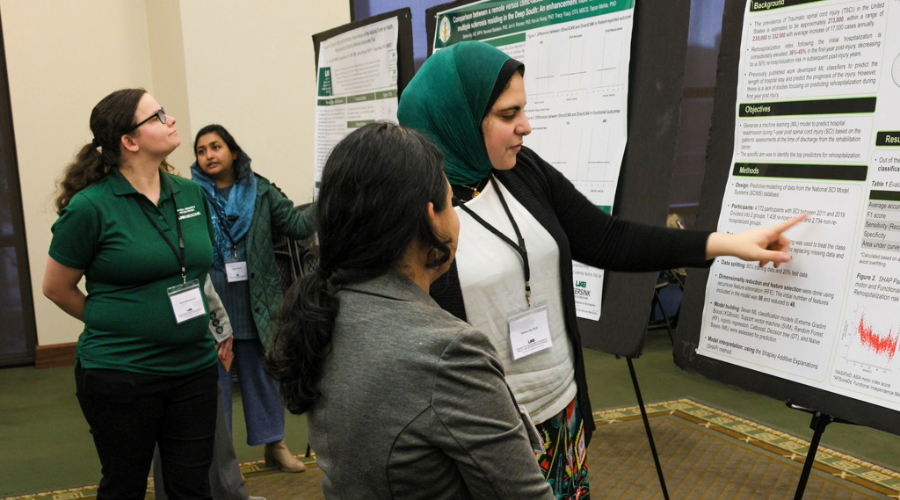
Research within the UAB Department of Family and Community Medicine focuses on chronic disease prevention and management across one’s lifespan and innovating health care delivery with cross-cutting themes of health equity. Each study aims to affect real-world change by determining scalable and sustainable programs and solutions to prevent and treat illness.
Department Lead:


Faculty-Led Studies and Projects
-
Adaptation and Pilot Testing a Behavioral Physical Activity Intervention with Peer Support for Women with HIV and Co-Occurring Hypertension
This project focuses on the adaptation of a behavioral physical activity intervention with peer support for women with HIV and co-occurring hypertension. Hypertension is the most common comorbidity among women with HIV. This research uses lifestyle behavior interventions to provide support for women with HIV and hypertension. This research aims to measure the feasibility and impact of introducing lifestyle behavior interventions, such as physical activity prescription, blood pressure monitoring, and peer support.
Principal Investigator: Kaylee Crockett, Ph.D.
Funding source: National Heart, Lung and Blood Institute (NHLBI) -
Effects of Dietary Protein Intake and Resistance Training on Retention of Fat Free Mass During Weight Loss in Adults Over 50 With Obesity
This study examines the separate and combined effects of a high-protein diet(HP) and resistance training (RT) on body composition and potential biological moderators of body weight in women and men over 50. All participants will receive guidance on dietary physical activity through our group-based weight loss program, State of Slim (SOS). The SOS program is delivered via Zoom. Participants are randomized to receive either a counseling-based high-protein diet plan or a resistance training plan. Body composition assessments at eight weeks identify responders and non-responders; the latter will be re-randomized to augment (HP: add protein supplements; RT: supervise RT) or combine (HP with protein supplements + supervised RT).
Principal Investigator: Drew Sayer, PhD -
Elucidating the Role of Weight: Stigma on Mental Health and Cario-Metabolic Risk among Women in the Women's Interagency HIV Study (Combined Cohort Study)
Both pain and obesity have emerged as common co-morbidities in the context of HIV. HIV-related stigma poses a significant barrier to improving health outcomes for people with HIV, with research supporting an association between internalized HIV stigma and pain. Extant research suggests obesity is also associated with pain but may interact with other variables in its association. This study aims to assess the interaction between internalized HIV stigma and BMI on the outcome of perceived acute pain.
Principal Investigator: Kaylee Crockett, Ph.D.
-
Exemplar: Determining the Best Practices for EMA (Ecological Momentary Assessment) Studies
Enhancements in mobile phone technology allow researchers to study the daily lives of children and adolescents like never before. Ecological momentary assessment (EMA) uses these advancements to allow in-depth measurements of links between context, behavior, and physiology in youths’ everyday lives. A large and diverse body of literature now exists on the use of EMA to study mental and behavioral health among youth. Modern EMA methods are built on a rich tradition of idiographic inquiry focused on the intensive study of individuals. Studies of child and adolescent mental and behavioral health have used EMA to characterize lived experience, document naturalistic within-person processes and individual differences in these processes, measure familiar constructs in novel ways and examine temporal order and dynamics in youths’ everyday lives.
Principal Investigator: Jamie Gajos, Ph.D. -
Development of an Adaptive Treatment Strategy for Weight Loss in People with Prediabetes Using a Sequential Multiple Assignment Randomized Trial (SMART)
This 16-week study used an experimental approach called the Sequential Multiple Assignment Randomized Trial to determine which combination and sequence of weight loss program features are most effective in people who are at risk for type 2 diabetes. Participants in the study will be initially randomized to consume either a high or reduced carbohydrate diet. After 4 weeks, participants will be identified as Responders (greater than or equal to 2.5% weight loss) or Non-Responders (less than 2.5% weight loss). Responders will continue with their initial randomized group for the remainder of the trial. Non-responders will be re-randomized to 2nd stage interventions of either including additional exercise counseling and training or beginning a time restricted eating protocol for the remainder of the trial.
Principal Investigator: Drew Sayer, Ph.D.
Funding source: National Institute of Diabetes and Digestive and Kidney Diseases (NIDDK) -
Momentary Geospatial, Psychological and Behavioral Risk for Substance Use in Young Adults Under Criminal Justice Supervision
In line with NIDA’s strategic objective of addressing real-world complexities of polysubstance use in vulnerable young adults, as well as identifying the context of these interactions to develop and disseminate effective interventions, this project tests the momentary psychological, behavioral, and geospatial risk for substance use in young adults under criminal justice supervision by integrating geographically-explicit ecological momentary assessment data with risk terrain modeling. Justice-involved young adults are more likely to struggle with substance use disorders than the general population, and their substance use often involves polysubstance use rather than single drug use. However, there is limited understanding of the naturalistic settings and psychological and behavioral antecedents of polysubstance use in vulnerable young adults. Like other vulnerable subgroups, substance use has often been examined with traditional methodologies, such as cross-sectional or clinical/lab-based designs; yet, these assessment methods are not well suited to capture the real-time interactions experienced by most young adults under criminal justice supervision.
Principal Investigator: Jamie Gajos, Ph.D.
Funding source: National Institute on Drug Abuse (NIDA)